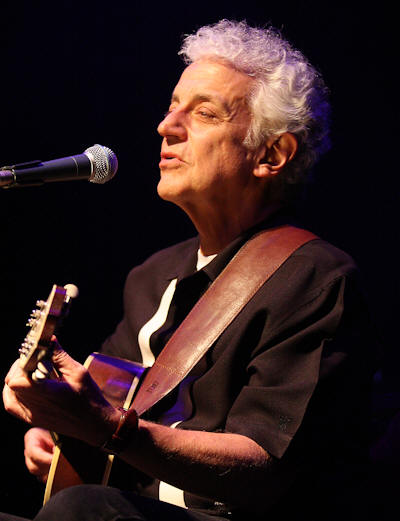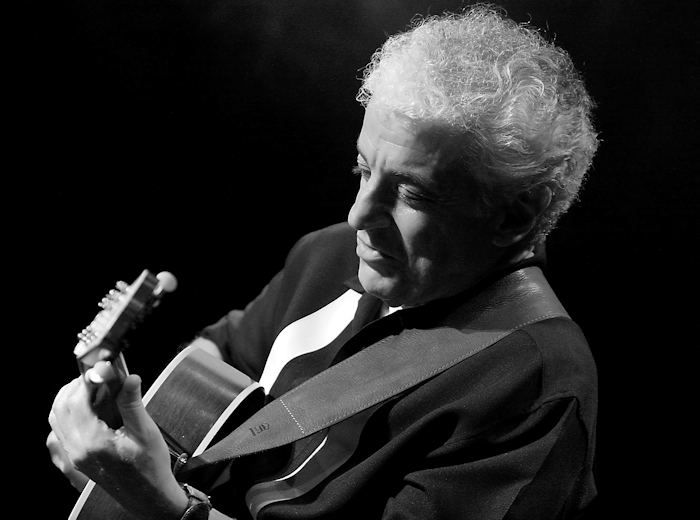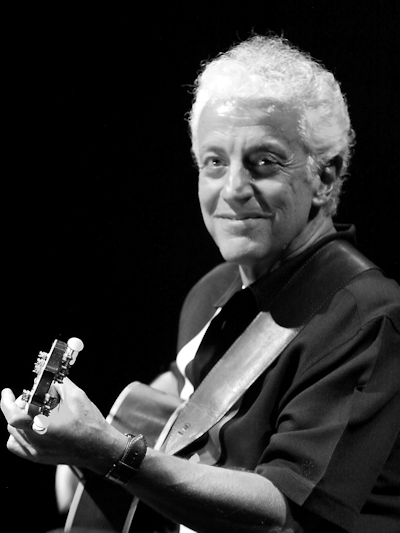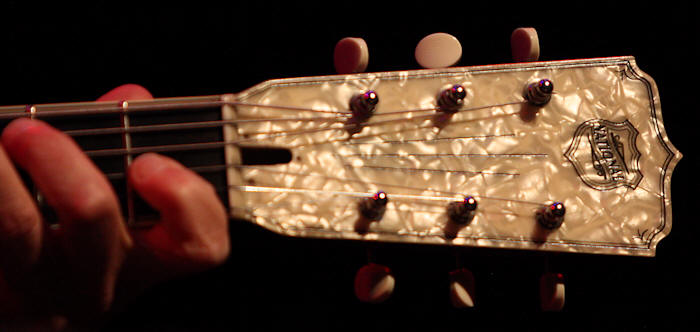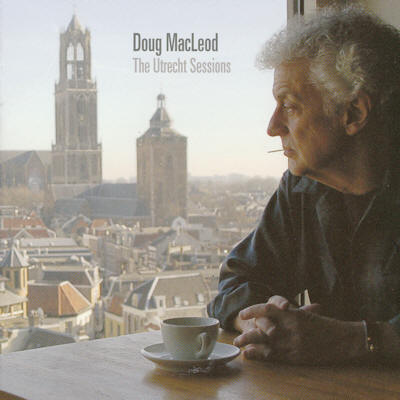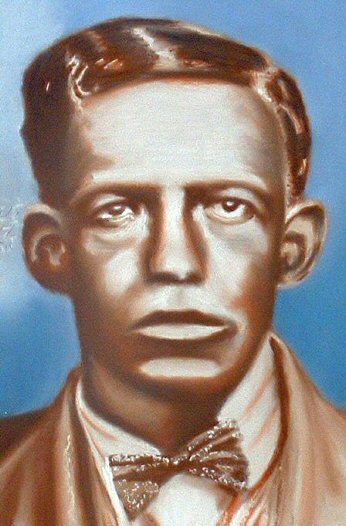
Painting © 2004 Loz
Arkle
Website
© Copyright 2000-2011 Alan White - All
Rights Reserved
Site optimised for Microsoft Internet Explorer



Early Blues Interview |
|
Doug MacLeod played the Burnley Blues Festival in April 2009, his only UK gig on his way back to the USA after touring Australia. I caught up with him before his set. Alan: What are your musical memories, growing up in North Carolina and St Louis? Doug: I don’t really have too many of North Carolina, but I do remember my Mom telling me that, when I was a baby, the folks next door to us were big Louis Jordan fans and when his music came on my Mom used to tell me that my foot would start tapping. When other music came on, my foot didn’t do anything, but when Louis Jordan came on, that was it!As for St Louis – what a great place to fall in love with blues music. Albert King was there, Little Milton, Ike and Tina Tuner. As high school guys, we’d go out and see these guys. When I was playing in the bands I remember I’d get a chance to play with the older black blues guys (who weren’t really that old then) and I’d lie to my parents and tell them I was going to the Catholic Youth Organisation dance and me and my friends would go and I’d play bass and sit in with them and get great musical lessons. Alan: Did you always want to become a musician?Doug: I believe I did, although it was either that or Formula 1 driving. In those days it was Grand Prix but of course I never had the chance of that. That’s one of the reasons I like coming over here [to the UK] because you guys like your racing. Alan: We sure do, and we do quite well, although we had a bit of trouble in the last one!How did you get started in music originally? Doug: I sort of had to really. I had a rough childhood and because of that early time, I had a bad stutter and couldn’t speak. I literally couldn’t speak. There would be one word and then a long stutter to the point where people would try and help me by saying the word and that just made it even worse. So, it was tough for me. As a bass player, I’d play in bands and that was a way to at least meet girls but then when they’d talk to me afterwards most of them just left because of the stutter. It was really getting bad. Then one day I picked up the guitar and because I’d been playing blues in these bands in St Louis, I knew the songs, and I just sang, and this voice came out. And I really haven’t stuttered since. So when people ask me how I got into blues, I prefer to think that the blues chose me. Alan: What kind of material were you playing in the early days?Doug: Oh, we just did all the stuff. Say, Albert King, Little Milton, Shake a Tail Feather by the Five Du-Tones… everything. For us, blues was on the radio 24 hours a day, on two stations in St Louis so we thought that was the Top 40. We were just playing the Top 40 hits at the dances. I remember when the Beach Boys came out, the guys in St Louis were saying, “Man, they are just ripping off Chuck Berry”. But we didn’t think about things like that too much because that’s just how it was. If I may use a non-correct term, there were white music stations and black music stations and we just gravitated towards the black because it was the music that we liked. It was great, to just hear this music all day. Alan: In the UK, we didn’t get that sort of chance. There was nothing on the radio and I remember getting an album of Chuck Berry as an import and it was just amazing.Doug: I was with Brownie McGhee and he turned me on to Alexis Korner. Wasn’t he one of the main guys to bring this stuff over? Alan: He was. But it was so difficult in those days to get hold of anything. The Rolling Stones introduced me to the likes of Chuck Berry, Howlin' Wolf and other bluesmen.Doug: They introduced a lot of Americans to the blues too. Not guys from where I was from because we already knew about it, but when I joined the navy and I went to San Diego I’d say to the other guys, “Have you heard of Albert King” and they’d say “Who?”. “Jimmy Read”. Again, “who?”. Alan: It’s been said a lot of UK bands like John Mayall, Alexis Korner, Rolling Stones did introduce a lot of Americans to the blues.Doug: I think that’s true
Doug: First of all, he would never use that word, he probably didn’t even know that word existed. I guess his philosophy would be “never play a note you don’t believe” but I also got from him, seriously, never, ever write or sing about what you don’t know about. He was very adamant about that. He was a scary guy, with his one eye and you never knew what he had in his pockets. I try and live by that now. Alan: Playing the blues, is from the heart. The passion is really there.Doug: As I got older I started to realise that’s what touches people and goes beyond languages. Alan: What are your memories playing with such greats as Lowell Fulson and Big Mama Thornton?Doug: Great memories! When you play behind Lowell Fulson, well, what a great inspiration for a young song writer. Lowell wrote great songs as well as great melodies, and people too often forget about the melodies in blues songs. Just to be there and be amongst that was a gift. Mama Thornton was a whole other thing together. The first time I was going to work with her, George Harmonica Smith said to me, “Doug, you’d better be careful because she’s rough”. I played the first set with her and I was playing electric in those days and I played real tasty, simple but good I thought and I was rather satisfied. I sat down after the first set thinking I’d done pretty good and then she came up right in my face and she said “Do you like me?” I said, “Sure, yes, I like you.” She said “What do you like about me?” I knew she was wearing men’s clothes, I’d heard that maybe she liked women but the first thing that came out of this young guy’s mouth was “I like your eyes”. She looked at me and said, “You like what?”. I said, I don’t mean any disrespect, but I like your eyes”. She said, “Oh, babe”. Then she turned round to George Harmonica Smith, who was peeping to make sure I’d be alright, and said, “You know what little Doug likes? He likes my eyes!” And from that day on, I could do no wrong with her. We were working at the Parisian Room with Pee Wee Crayton and it came up to Mama’s time to be on stage and she said, “I want to hear some guitar” so I deferred to Peewee of course and he started solo. And Mama said, on the stage, “Pee Wee, I don’t wanna hear you, I wanna hear Little Doug play”. Afterwards, Peewee came up to me and I thought he was going to be angry but he said “What did you do to that woman?”
Alan: Who are your favourite blues artists? Doug: Well, I met several, including BB King last summer and that was a treat. I liked Albert King too, not only for his guitar playing but I also liked the way he sang. I met him too, and he did a song of mine. I met Brownie McGee, who was a really under-rated guitar player with an incredible style. There were also the guys I was close with, like Pee Wee Crayton, George Harmonica Smith, who were huge influences on my life.Then there were the ones I wish I’d met, like Tampa Red who was a huge influence on me, as well as Big Bill Broonzy and Lightnin' Hopkins who I missed seeing by a day. And, of course, Son House, who was just an incredible player. When you hear the old stuff of his and then you hear Robert Johnson right afterwards, you think “Oh goodness, Robert Johnson was knocking on Son House’s door” Alan: What is it, nearly 350 compositions you’ve done now?Doug: Hah – much more than that! But how many of them were good!! Alan: Which were your favourites?Doug: Favourites? Man, that’s like asking me to choose between my children! I don’t know! I guess my favourites are the ones I’m writing right now. They’re going to be on the next album and there are some good ones. When I think of them all....well, Alan I’d love to answer your question, but I don’t know how to answer that. My wife says I give birth to them and she says she lives through the birthing pain. Alan: Your songs have been recorded by many artists, so which are your favourite interpretations?Doug: I have a couple of favourites. One was Eva Cassidy’s version of Nightbird. That song is about a prostitute, a prostitute that I used to live with who really watched out for me. I have no idea if Eva Cassidy knew what that song was about and I never heard it until my wife played it for me during a drive to Los Angeles from San Luis Opisbo. I’m a huge baseball fan and my team, the Cardinals from St Louis, were playing the Dodgers and I wanted to listen to the game. My wife said “I got something for you to hear”, and I said, “But the Cardinals are on” and she said “This is more important than the Cardinals” and she put this CD on of Eva Cassidy. I tell you, it moved me so much, I pulled over to the side of the road and I was weeping. I have never done that song again. When people ask me to do Nightbird, I tell them that if they want to hear THE version, she is the one to listen to. And then of course she died before I got a chance to meet her to ask her how she interpreted it like that.The other song of mine that I think was a great version was Albert Collins doing Working Man Blues. It’s on his Cold Snap album and I think he just nailed it. Alan: What’s the best Blues album you ever bought?Doug: Could I give you maybe three? Perhaps four? Or even five?? One of my all time favourites is Live at the Regal with BB King, The Story of the Blues Big Bill Broonzy Born under a Bad Sign Albert King, and I'm Jimmy Reed with “Honest I do" on it. That was a real favourite of mine. And more recently, you can now get the collected works of Tampa Red. He was incredible as a solo artist and with his bands. Alan: What is your favourite instrument?Doug: To play, it’s the guitar. I love National guitars and it would be between the three of these – Spook, Mule and Scrapper. Mule is an M1 which has my own design of a Seymour Duncan P90 and a Highlander combined on it. Spook is a simple Delphi, off the wall guitar, that you can get anywhere. And Scrapper is a Style 1 Tricone and all my Nationals are set up just like you’d buy them. They don’t do anything special for me, other than make sure all the frets are good.
Doug: Most of them do. This Old River from the Utrecht sessions is about my friend Marie Gaines, who was the wife of Mac and who passed away from cancer. Norfolk County Line is about an old girlfriend; you know when you make a mistake in life and you hurt somebody. But there are many of these and it depends what day you get me and what mood I’m in. Alan: Do you still do Doug’s Back Porch column for Blues Review?Doug: Yes, I still write that. I do stories and will do as long as there are still stories to do. But I’m gonna stop before I get to the lies! We’re doing something a bit different now on the website, where we have DubbDrops where we have pictures and I write stories about the interesting things that come out from travelling Alan: Of all the festivals you’ve done, what’s been most memorable?Doug: Most festivals, the most memorable thing that happens is when one guy sits on one chair and people accept it. Alan: Do you still do your guitar workshops?Doug: Oh yes, and I love doing that. In fact, we are going to do a new slide DVD in July. Alan: You’re renowned for your story telling. What inspired you to tell stories in the first place?Doug: Well a couple of things did, Alan. First of all, I was in the folk circuit and they are always telling stories so, being a blues guy, I told some stories too and that’s how it started. Then some of the old Blues guys, like Earnest Banks and Brownie McGee, told stories too and I thought that was pretty cool. But the main thing that got the stories so long was when I had my band and we were playing all of my music with no covers at all. We were working Sunday and Monday night at a place called Rubens and we had to fill four and a half hours but I’d only written about 22 songs so in-between I’d tell stories about the songs and it would fill up some time. Then, when we got to the last set and all the songs and the stories were done, I’d say that we’d had a request for some of the songs we’d done earlier. I neglected to tell them that I was the guy requesting those songs. 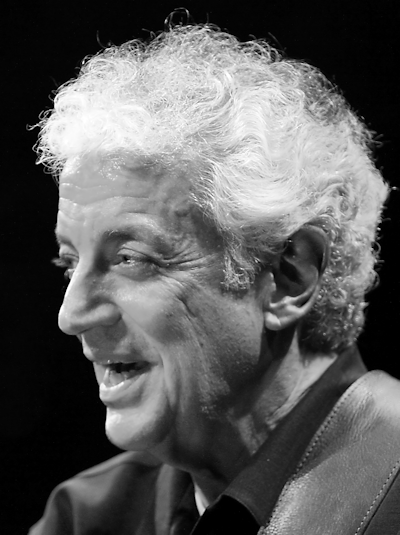 Alan:
Some
music
styles
are
fads,
but
the
blues
is
always
with
us. Why do
you think that is? Alan:
Some
music
styles
are
fads,
but
the
blues
is
always
with
us. Why do
you think that is? Doug: It’s honest. It’s real. And it talks about what everybody feels. There is no colour in this music or in listening to it. And there shouldn’t be no colour in the playing. If you play it with your heart, you play with your soul, and there shouldn’t be no colour. The blues is all about people. Blues is what we all go through – the simple basic emotions that each of us deal with every day. You want somebody to love you; you want somebody to love; you want some food on table; you want a nice place to live; you want your kids to be alright, you want the basics and the blues speaks to that. It also makes you celebrate life. Alan: Yes! The blues is happy musicDoug: It is happy music. And for the sad music that comes by, I always tell folks to listen because they are hearing somebody who has gone through what you are going through, and they’ve survived it, and is doing well, so you can make it too. Alan: You’ve just done a tour of Australia. Did that go well?Doug: It did! I did see some kangaroos and some wombats. Alan: I don’t think you’ll see those here in Burnley!Doug: If I do, we got ourselves a scoop! Alan: So after Burnley, you are doing a tour of the States. Where are you going to?Doug: We are starting in Kansas City and then we’re going to go to the Blues Awards in Memphis. Alan: Fingers crossed!Doug: I hope so. We’ve then got a big festival, the MerleFest, and I’m really looking forward to that because I’m a big fan of Doc Watson. That new River Blues that he plays... excellent. Then back to Europe, including Switzerland, Germany, Serbia, Portugal, UK, Ireland and then back home. Thank you very much Doug. It’s been a great pleasure.Alan White - earlyblues.com ________________________________________________________________________ Check out Doug's latest CD: The Utrecht Sessions
Return to Blues Interviews List
Website, Photos & Text © Copyright 2000-2009 Alan
White. All Rights Reserved. |





